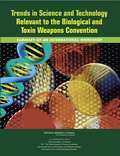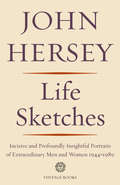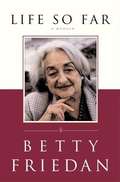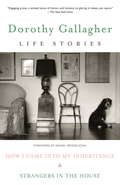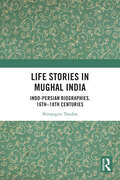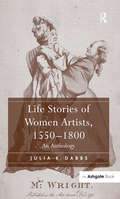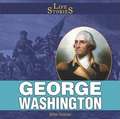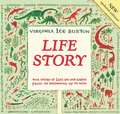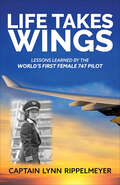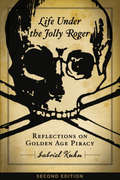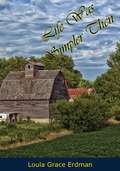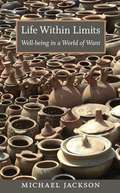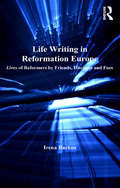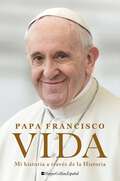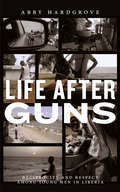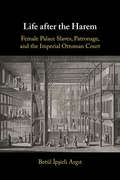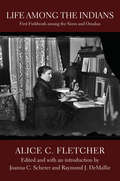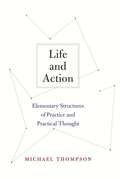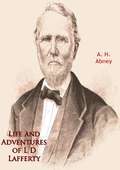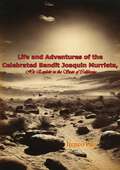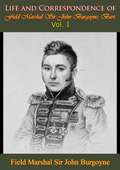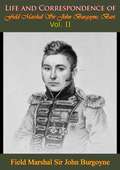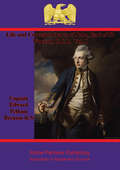- Table View
- List View
Life Sciences and Related Fields
by International Union of Biochemistry Molecular BiologyDuring the last decade, national and international scientific organizations have become increasingly engaged in considering how to respond to the biosecurity implications of developments in the life sciences and in assessing trends in science and technology (S&T) relevant to biological and chemical weapons nonproliferation. The latest example is an international workshop, Trends in Science and Technology Relevant to the Biological Weapons Convention, held October 31 - November 3, 2010 at the Institute of Biophysics of the Chinese Academy of Sciences in Beijing. Life Sciences and Related Fields summarizes the workshop, plenary, and breakout discussion sessions held during this convention. Given the immense diversity of current research and development, the report is only able to provide an overview of the areas of science and technology the committee believes are potentially relevant to the future of the Biological and Toxic Weapons Convention (BWC), although there is an effort to identify areas that seemed particularly ripe for further exploration and analysis. The report offers findings and conclusions organized around three fundamental and frequently cited trends in S&T that affect the scope and operation of the convention: The rapid pace of change in the life sciences and related fields; The increasing diffusion of life sciences research capacity and its applications, both internationally and beyond traditional research institutions; and The extent to which additional scientific and technical disciplines beyond biology are increasingly involved in life sciences research. The report does not make recommendations about policy options to respond to the implications of the identified trends. The choice of such responses rests with the 164 States Parties to the Convention, who must take into account multiple factors beyond the project's focus on the state of the science.
Life Sketches
by John HerseyThis collection—harvest of a lifetime of brilliant reportage and reflection—brings together the most memorable biographical pieces John Hersey has written over the past fifty years. His subjects range from Sinclair Lewis, for whom the twenty-three-year-old Hersey was secretary, and the young John F. Kennedy as he related to Hersey the dramatic story of PT 109, to Private John Daniel Ramey and his efforts to overcome illiteracy with the help of the U.S. Army, and Jessica Kelley, an elderly widow trapped in a buckling tenement as the 1955 Connecticut floods raged outside. Whether describing a brisk morning stroll with President Truman or hours spent fishing for blues with Lillian Hellman, recounting Benjamin Weintraub’s harrowing escape from a Nazi death camp or Varsell Pleas’s dangerous struggle for voting rights in the Mississippi of 1964, Hersey brings us face to face with some of the extraordinary events and people of the past half century. And it is with his profoundly curious and sympathetic mind and unsurpassed journalistic eloquence that he brings each startlingly to life. “The skill that won Hersey a Pulitzer Prize in 1945 is more than evident… an important collection of lives and their lessons.” –The New York Times Book Review “Any reader not already a fan of Hersey’s will be swayed by the richness of this collection. Hersey’s legion of admirers will merely be gratified and moved again and again…The cumulative force of these essays is amazing.” –Kirkus Reviews
Life So Far
by Betty Friedan"At last Betty Friedan herself speaks about her life and career. With the same unsparing frankness that made The Feminine Mystique one of the most influential books of our era, Friedan looks back and tells us what it took - and what it cost - to change the world." "In Life So Far, Friedan takes us on an intimate journey through her life - a lonely childhood in Peoria, Illinois, salvation at Smith College; her days as a labor reporter for a union newspaper in New York (from which she was dismissed when she became pregnant); unfulfilling and painful years as a suburban housewife; finding great joy as a mother; and writing The Feminine Mystique, which grew out of a survey of her Smith classmates and started it all." "Friedan chronicles the secret underground of women in Washington, D.C., who drafted her in the early 1960s to spearhead an "NAACP" for women, and recounts the courage of many, including some Catholic nuns who played a brave part in those early days of NOW, the National Organization for Women. She recognized early that the women's movement would falter if institutions did not change to reflect the new realities of women's lives, and she fought to keep the movement practical and free of extremism, including "man-hating." She describes candidly the movement's political infighting that brought her to the point of legal action and resulted in a long breach with fellow leaders Gloria Steinem and Bella Abzug." "In this volume, Friedan brings to extraordinary life her bold and contentious leadership in the movement. She lectures, writes, leads think tanks, and organizes women and men to work together in political, legal, and social battles on behalf of women's rights."
Life Stories
by Dorothy GallagherHere are two acclaimed memoirs in one remarkable volume. In an extraordinarily compelling voice, Dorothy Gallagher tells stories taking us from her parents' beginnings in the Ukraine to her own childhood in 1940s New York, through the many adventures of her extended family and into her own adult life. Her themes are universal: the fragility of friendship, the power of love, the marital crisis brought on by chronic illness, the role of dumb luck at the heart of life-Gallagher dramatizes her stories with acute insight, strong feeling, and edgy wit.
Life Stories in Mughal India: Indo-Persian Biographies, 16th-18th centuries
by Shivangini TandonSituated at the intersections between history and literature, the book explores the life-stories written in the Mughal period to recover socio-cultural developments in the period. It focuses on the genre of life-stories and looks at the complex interactions between agency and the ruling structure in shaping historical formations.The biographical dictionaries explored in this book highlight the significance of the agency of political actors, and the strategies through which the aristocrats and the elites reproduced the political system. At the same time, these texts are also quite helpful in recovering processes through which the ordinary people, in routine, everyday forms negotiated with and contested the political system. Delving into the life-narratives preserved in the tazkiras or biographical compendia, this book looks at the household as a political formation and positions the aristocratic households as integral to the reproduction of imperial sovereignty. The work also delves into the world of emotions and argues for the need to draw linkages between political developments and shifts in emotions and affect.This book will be an essential resource for scholars and researchers of history especially early modern history, cultural studies, literature, sociology, South Asian history. It will also be of interest to those studying gender and political discourse in early modern South Asia.
Life Stories of Women Artists, 1550-1800: An Anthology
by JuliaK. DabbsThe struggles and achievements of forty-six notable women artists of the early modern period, as documented by their contemporaries, are uniquely brought together in this anthology. The life stories presented here are foundational texts for the history of art, but since most are found only in rare volumes and few have been translated into English, until now they have been generally inaccessible to many scholars. Originally published in biographical compendia such as Vasari's Lives of the Artists, the writings included here document not only the lives of relatively well known women artists such as Artemisia Gentileschi and Sofonisba Anguissola, but also those who have languished in obscurity, like Anna Waser and Li Yin. Each life story is preceded by a brief introduction to the artist as well as to her biographer, and the texts themselves are annotated to provide necessary clarification. Beyond their documentary value, these stories provide fascinating insight as to how men commonly characterized women artists as exceptions to their sex, and attempted to explain their presence in the male-dominated realm of art. The introductory chapter to the book explores this intriguing gender dynamic and elucidates some of the strategies and historical context that factored into the composition of these lives. The volume includes an appended index to women artists' life stories in biographical compendia of the period
Life Stories: George Washington
by Gillian GosmanGeorge Washington was the Commander of the Continental Army during the American Revolution and the beloved first president of the United States. Readers will learn about the full span of Washington's life, from his childhood through his post-presidential years, in a biography that is woven with lessons on citizenship and patriotism. The book includes helpful timelines and thoughtful information about this cherished founding father.
Life Story
by Virginia Lee BurtonEarth takes center stage in this updated version of Virginia Lee Burton's 1962 classic Life Story. Told through five acts, Burton's art and text tell the history of earth from beginning to present day. Readers will gain an in-depth understanding of the planet's history and their leading roles in it today. The book has been updated with cutting-edge science, including up-to-the-minute information on fossil records and the geologic principles. We are thrilled to provide this updated artistic and visionary work in time for the anniversary of Virginia Lee Burton's 100th birthday.
Life Takes Wings: Becoming the World's First Female 747 Pilot
by Lynn Rippelmeyer&“A true story of a woman&’s drive and intensity, told with humility, grace and humor. Life Takes Wings is a great American flying story.&” —Deborah Douglas, author of American Women and Flight In Life Takes Wings, Captain Lynn Rippelmeyer soars with inspiration from a starry-eyed farm girl gazing at the sky to flight attendant to first female pilot of the revolutionary Boeing 747. More than just a story of one woman&’s love affair with the skies, Life Takes Wings combines lessons in tenacity, humility, humor, perseverance, and partnership with the exhilaration of defying social norms, and the rewards of being true to oneself. Inspired to become a commercial airline pilot in an age when it was not an option for girls, serendipitous relationships lead Lynn to her first flying lessons in a seaplane, then to becoming flight instructor and charter pilot while also working as a flight attendant. Perceived as being incapable of flying, women were relegated to the cabin. Ignoring the pilots&’ negative comments, Lynn became a number of aviation&’s female firsts—member of first all-female commercial airline crew, first flight attendant-to-pilot, and first female pilot of the Boeing 747. Through laughter and tears, Life Takes Wings shows the sky is no limit for those who follow their dreams. &“Captain Rippelmeyer&’s book is one of the best chronicles of a flying life that I have ever read. She meets turbulence with determination and fortitude, but with a positive approach and a marvelous sense of humor, which seems to be rare these days.&” —Jacqueline Boyd, PhD, chair, Amelia Earhart Memorial Scholarship Fund and 99s 2020 recipient of the Award of Achievement for Contributions to Aviation
Life Through Time: The 700-Million-Year Story of Life on Earth (DK Panorama)
by John WoodwardTravel back in time and watch the incredible story of life on Earth unfold.Life Through Time explores the origins of species that still exist today in early fish, amphibians, birds, reptiles, and mammals. It takes readers through the years of dinosaurs and megafauna up to the appearance of our first human ancestors around six million years ago, to the evolution of hunter-gathering Homo sapiens in the Ice Age and the first civilizations.Perfect for children and parents to read together and discover the incredible story of life on our planet. Open the book and let the 700-million-year journey begin!
Life Under the Jolly Roger: Reflections on Golden Age Piracy
by Gabriel KuhnOver the last couple of decades, an ideological battle has raged over the political legacy and cultural symbolism of the "golden age" pirates who roamed the seas between the Caribbean Islands and the Indian Ocean from roughly 1690 to 1725. They are depicted as romanticized villains on the one hand and as genuine social rebels on the other. Life Under the Jolly Roger examines the political and cultural significance of these nomadic outlaws by relating historical accounts to a wide range of theoretical concepts—reaching from Marshall Sahlins and Pierre Clastres to Mao Zedong and Eric J. Hobsbawm via Friedrich Nietzsche and Michel Foucault. With daring theoretical speculation and passionate, respectful inquiry, Gabriel Kuhn skillfully contextualizes and analyzes the meanings of race, gender, sexuality, and disability in golden age pirate communities, while also surveying the breathtaking array of pirates' forms of organization, economy, and ethics. Life Under the Jolly Roger also provides an extensive catalog of scholarly references for the academic reader. Yet this delightful and engaging study is written in language that is wholly accessible for a wide audience. This expanded second edition includes an appendix with interviews about contemporary piracy, the ongoing fascination with pirate imagery, and the thorny issue of colonial implications in the romanticization of pirates.
Life Was Simpler Then
by Loula Grace ErdmanIn this charming book of personal recollections, the author, Loula Grace Erdman, returns to her childhood in western Missouri and recreates the way of life as she then knew it. There is, for instance, and amusing section on the series of hired men who helped on the farm, followed by chapters on spring house cleaning, on family reunions, on church attendance, on the Chautauqua. It was a time where there was a second table for the children at dinner parties, when a helpful, omniscient Central was at the other end of the telephone wire, when harvesting ice or making apple butter was a neighborhood affair. It is only yesterday in a small American town.These lively reminiscences are touched here and there with humor and pathos and everywhere with that nostalgia which springs from the near resemblance of the author’s recollections to our own. Of Ms. Erdman’s many successful books, Life Was Simpler Then is likely to be remembered most fondly—and longest.
Life Within Limits: Well-being in a World of Want
by Michael JacksonThe sense that well-being remains elusive, transitory, and unevenly distributed is felt by the rich as well as the poor, and in all societies. To explore this condition of existential dissatisfaction, the anthropologist Michael Jackson traveled to Sierra Leone, described in a recent UN report as the "least livable" country in the world. There he revisited the village where he did his first ethnographic fieldwork in 1969-70 and lived in 1979. Jackson writes that Africans have always faced forces from without that imperil their lives and livelihoods. Though these forces have assumed different forms at different times--slave raiding, warfare, epidemic illness, colonial domination, state interference, economic exploitation, and corrupt government--they are subject to the same mix of magical and practical reactions that affluent Westerners deploy against terrorist threats, illegal immigration, market collapse, and economic recession. Both the problem of well-being and the question of what makes life worthwhile are grounded in the mystery of existential discontent--the question as to why human beings, regardless of their external circumstances, are haunted by a sense of insufficiency and loss. While philosophers have often asked the most searching questions regarding the human condition, Jackson suggests that ethnographic method offers one of the most edifying ways of actually exploring those questions.
Life Writing in Reformation Europe: Lives of Reformers by Friends, Disciples and Foes (St Andrews Studies In Reformation History Ser.)
by Irena BackusThe Reformation period witnessed an explosion in the number of biographies of contemporary religious figures being published. Whether lives of reformers worthy of emulation, or heretics deserving condemnation, the genre of biography became a key element in the confessional rivalries that raged across Europe in the sixteenth and seventeenth centuries. Offering more than a general survey of Life writing, this volume examines key issues and questions about how this trend developed among different confessions and how it helped shape lasting images of reformers, particularly Luther and Calvin up to the modern period. This is the first-ever full length study of the subject showing that Lives of the reformers constitute an integral part of the intellectual and cultural history of the period, serving as an important source of information about the different Reformations. Depending on their origin, they provide a lesson in theology but also in civic values and ideals of education of the period. Genevan Lives in particular also point up the delicate issue of 'Reformed hagiography' which their authors try to avoid with a varying degree of success. Having consistently been at the forefront of the study of the intellectual history of the Reformation Irena Backus is perfectly placed to highlight the importance of Life writing. This is a path-breaking study that will open up a new way of viewing the confessional conflicts of the period and their historiography.
Life \ Vida (Spanish edition): Mi historia a través de la historia
by Pope FrancisPor primera vez, el papa Francisco cuenta la historia de su vida, revisitada a través de los acontecimientos que han marcado a la humanidad en los últimos ochenta años, desde el estallido de la Segunda Guerra Mundial en 1939, cuando el futuro era un niño, hasta nuestros días. Vida es un viaje extraordinario por la historia del mundo a través de la mirada de un hombre excepcional. Con observaciones agudas y reflexiones profundas, el papa Francisco nos transporta a los sucesos más significativos de los últimos tiempos, desde el Holocausto hasta la caída del Muro de Berlín, pasando por el golpe de Videla en la Argentina y el Mundial de 1968, cuando Maradona marcó el famoso gol de la «mano de Dios». Desde su mirada única, el pontífice comparte en estas páginas sus recuerdos y reflexiones del Holocausto, las bombas atómicas de Hiroshima y Nagasaki, el ataque a las Torres Gemelas en 2001, la recesión económica de 2008, la pandemia, la renuncia de Benedicto XVI y el cónclave que lo eligió. El «papa callejero» abre su baúl de los recuerdos y, con la franqueza que lo caracteriza, nos transmite mensajes importantes sobre las principales crisis que nos confrontan hoy en día, entre otras, la desigualdad social, la crisis climática, la guerra, la carrera armamentística, la discriminación y las luchas en favor de la vida. «No hay que olvidar la lección más importante: podemos releer la historia de nuestra vida para hacer memoria y poder transmitir algo a quien nos escucha. Pero, para aprender a vivir, todos tenemos que aprender a amar». —Papa Francisco----For the first time, Pope Francis tells the story of his life as he looks back on the momentous world events that have changed history—from his earliest years during the outbreak of World War II in 1939 to the turmoil of today. An extraordinary personal and historical journey, Life is the story of a man and a world in dramatic change. Pope Francis recalls his life through memories and observations of the most significant occurrences of the past eight decades, from the Holocaust to the fall of the Berlin Wall, Videla’s coup in Argentina to the moon landing in 1969, and even the 1986 World Cup in which Maradona scored the unforgettable “hand of God” goal.Here are the frank assessments and intimate insights of a pastor reflecting on the Nazi extermination of the Jews, the atomic bombings of Hiroshima and Nagasaki, the 2001 terrorist attack on America and the collapse of the Twin Towers, the great economic recession of 2008, the Covid-19 pandemic, the retirement of Pope Benedict XVI, and the subsequent conclave that elected him Pontiff. The “pope callejero” recounts these world-changing moments with the candor and compassion that distinguishes him, and offers important messages on major crises confronting us now, including social inequalities, climate change, international war, atomic weapons, racial discrimination, and the battles over social and cultural issues.
Life after Guns: Reciprocity and Respect among Young Men in Liberia
by Abby HardgroveLife After Guns explores how ex-combatants and other post-war youth negotiated a depleted and difficult social and cultural landscape in the years following Liberia’s fourteen-year bloody civil war. Unlike others who study child soldiers, Abby Hardgrove’s ethnography looks at both former combatants and also the youth who were not recruited to fight. She focuses on the structural constraints and household and family organizations that either helped or limited opportunities as these young men grew into adulthood. Whether young men fought or not, and whether they had cultural capital before the war or not, family relations mattered a great deal in how they fared after the war.
Life after the Harem: Female Palace Slaves, Patronage and the Imperial Ottoman Court
by Betül Ipsirli ArgitThe first study to explore the lives of female slaves of the Ottoman imperial court, including the period following their manumission and transfer from the imperial palace. Through an analysis of a wide range of hitherto unexplored primary sources, Betül İpşirli Argıt demonstrates that the manumission of female palace slaves and their departure from the palace did not mean the severing of their ties with the imperial court; rather, it signaled the beginning of a new kind of relationship that would continue until their death. Demonstrating the diversity of experiences in non-dynastic female-agency in the early-modern Ottoman world, Life After the Harem shows how these evolving relationships had widespread implications for multiple parties, from the manumitted female palace slaves, to the imperial court, and broader urban society. In so doing, İpşirli Argıt offers not just a new way of understanding the internal politics and dynamics of the Ottoman imperial court, but also a new way of understanding the lives of the actors within it.
Life along the Silk Road
by Susan WhitfieldIn this long-awaited second edition, Susan Whitfield broadens her exploration of the Silk Road and expands her rich and varied portrait of life along the great pre-modern trade routes of Eurasia. This new edition is comprehensively updated to support further understanding of themes relevant to global and comparative history and remains the only history of the Silk Road to reconstruct the route through the personal experiences of travelers. In the first 1,000 years after Christ, merchants, missionaries, monks, mendicants, and military men traveled the vast network of Central Asian tracks that became known as the Silk Road. Whitfield recounts the lives of twelve individuals who lived at different times during this period, including two characters new to this edition: an African shipmaster and a Persian traveler and writer during the Arab caliphate. With these additional tales, Whitfield extends both geographical and chronological scope, bringing into view the maritime links across the Indian Ocean and depicting the network of north-south routes from the Baltic to the Gulf. Throughout the narrative, Whitfield conveys a strong sense of what life was like for ordinary men and women on the Silk Road, the individuals usually forgotten to history. A work of great scholarship, Life along the Silk Road continues to be both accessible and entertaining.
Life among the Indians: First Fieldwork among the Sioux and Omahas (Studies in the Anthropology of North American Indians)
by Alice C. FletcherAlice C. Fletcher (1838–1923), one of the few women who became anthropologists in the United States during the nineteenth century, was a pioneer in the practice of participant-observation ethnography. She focused her studies over many years among the Native tribes in Nebraska and South Dakota.Life among the Indians, Fletcher&’s popularized autobiographical memoir written in 1886–87 about her first fieldwork among the Sioux and the Omahas during 1881–82, remained unpublished in Fletcher&’s archives at the Smithsonian Institution for more than one hundred years. In it Fletcher depicts the humor and hardships of her field experiences as a middle-aged woman undertaking anthropological fieldwork alone, while showing genuine respect and compassion for Native ways and beliefs that was far ahead of her time. What emerges is a complex and fascinating picture of a woman questioning the cultural and gender expectations of nineteenth-century America while insightfully portraying rapidly changing reservation life. Fletcher&’s account of her early fieldwork is available here for the first time, accompanied by an essay by the editors that sheds light on Fletcher&’s place in the development of anthropology and the role of women in the discipline.
Life and Action: Elementary Structures of Practice and Practical Thought
by Michael ThompsonIn a book as entertaining as it is enlightening, Kristin Thompson offers the first in-depth analysis of Hollywood's storytelling techniques and how they are used to make complex, easily comprehensible, entertaining films. She also takes on the myth that modern Hollywood films are based on a narrative system radically different from the one in use during the Golden Age of the studio system. Drawing on a wide range of films from the 1920s to the 1990s--from Keaton's Our Hospitality to Casablanca to Terminator 2--Thompson explains such staples of narrative as the goal-oriented protagonist, the double plot-line, and dialogue hooks. She domonstrates that the "three-act structure," a concept widely used by practitioners and media commentators, fails to explain how Hollywood stories are put together. Thompson then demonstrates in detail how classical narrative techniques work in ten box-office and critical successes made since the New Hollywood began in the 1970s: Tootsie, Back to the Future, The Silence of the Lambs, Groundhog Day, Desperately Seeking Susan, Amadeus, The Hunt for Red October, Parenthood, Alien, and Hannah and Her Sisters. In passing, she suggests reasons for the apparent slump in quality in Hollywood films of the 1990s. The results will be of interest to movie fans, scholars, and film practitioners alike.
Life and Adventures of L D Lafferty: Being A True Biography of One of the Most Remarkable Men of the Great Southwest
by A. H. AbneyThe story chronicles the escapades of Lafferty through the Louisiana, Missouri and Arkansas Territories, the lands of the Old Settler Cherokees, and into the new frontier of Texas."L. D. Lafferty has been described as a rough ashlar of reckless daring and thoughtless intrepidity and a youthful adventurer who had fought Indians at the age of 15." - We Never Retreat: Filibustering Expeditions into Spanish Texas (2015)"L. D. Lafferty, a contemporary of Lafitte's, recalled that Lafitte frankly confessed that he had enough silver and gold on the island to freight a ship." -Mysteries and Legends of Texas (2010)"Lorenzo Dow Lafferty, son of a Tennessee Indian trader who followed the Cherokees to Arkansas in 1810, spent three of his teenage years (1815-1818) living in a Cherokee town on the White River." -The Arkansas Historical Quarterly (1997)
Life and Adventures of the Celebrated Bandit Joaquin Murrieta, His Exploits in the State of California
by Ireneo PazDelve into the legendary tale of one of California's most infamous figures with Ireneo Paz's Life and Adventures of the Celebrated Bandit Joaquin Murrieta: His Exploits in the State of California. This riveting narrative brings to life the story of Joaquin Murrieta, a Mexican bandit whose name became synonymous with rebellion and justice during the tumultuous Gold Rush era.Ireneo Paz, a masterful storyteller, combines meticulous research with vibrant prose to paint a comprehensive portrait of Murrieta's life. From his humble beginnings to his rise as a feared and admired outlaw, the book explores the socio-political landscape of mid-19th century California, marked by racial tensions, economic upheaval, and the quest for fortune.Through detailed accounts of Murrieta's daring escapades, readers will be captivated by the daring heists, narrow escapes, and the relentless pursuit by law enforcement. Paz delves into the motivations behind Murrieta's transformation from a victim of injustice to a symbol of resistance, capturing the complexities of his character and the era he lived in.Life and Adventures of the Celebrated Bandit Joaquin Murrieta is not just a tale of crime and retribution; it is a poignant exploration of identity, resilience, and the human spirit. Paz's vivid descriptions and compelling storytelling offer a window into the cultural and historical context that shaped Murrieta's legend, making this book an essential read for history enthusiasts, adventure seekers, and anyone fascinated by the rich tapestry of California's past.Join the adventure and uncover the truth behind the myth of Joaquin Murrieta, a man whose legacy continues to intrigue and inspire.
Life and Correspondence of Field Marshal Sir John Burgoyne, Bart. — Vol. I (Life and Correspondence of Field Marshal Sir John Burgoyne, Bart. #1)
by George Wrottesley R.E. Field Marshal Sir John Burgoyne Bart.This ebook is purpose built and is proof-read and re-type set from the original to provide an outstanding experience of reflowing text for an ebook reader. Sir John Fox Burgoyne, illegitimate child of General John Burgoyne, started life with few prospects of greatness but ended his life as a hugely respected Field Marshal of the British army; his funeral in 1871 was attended by no less than "Her Majesty the Queen, H.R.H. the Prince of Wales, H.R.H. the Duke of Edinburgh, H.R.H. Prince Arthur, His Majesty the King of the Belgians... Among the British Officers assembled, were two Field-Marshals, ten full Generals, of whom seven wore the insignia of Grand Cross of the Bath, three Lieut.-Generals, fifteen Major-Generals, including Prince Edward of Saxe Weimar..." Destined for a military career from birth, he was commissioned into the Royal Engineers on 29th August 1798. At the time the Royal Engineers were a small body of men with specialized knowledge, primarily commissioned officers with few enlisted men - even a new Lieutenant was a person of consequence due to his rarity and skills, and the paucity of advancement that relied purely on seniority of service. He did not have to wait long before being flung into action during the blockade of Malta and then the invasion of Denmark. However, the majority of this book consists of letters and journal entries of his experiences during the Peninsular War. As one of the few engineers with the Duke's army, he was given important assignments during the sieges that dominated the movements of the Allied forces; his notes are all the more important for their commentary of the siege operations such as Badajoz and Ciudad Rodrigo that were undertaken from his expert knowledge. Notwithstanding the high casualty rates amongst the Engineers, Sir John survived the War to be employed on the disastrous expedition to New Orleans in 1814. His post-Napoleonic career was stunted by lack of potential advancement, so much so that he became involved in civil engineering and work on fortifications. He was posted to Ireland where he endeavoured to improve the conditions of the poor, particularly straining all his influence during the disastrous potato famine. Whilst doing this he was also a frequent correspondent with the military establishment over improvements and clashed with the indifference of politicians and their budgets. The first volume ends with the beginnings of the tension with Russia and his coming employment in the Crimea. Title - Life and Correspondence of Field Marshal Sir John Burgoyne, Bart. -- Vol. I Series Name - Life and Correspondence of Field Marshal Sir John Burgoyne, Bart. Series Number -- I Author -- Field Marshal Sir John Burgoyne, Bart.(1782-1871) Editor -- Lieut.-Colonel the Hon. George Wrottesley (R.E.) (1827-1909) Text taken, whole and complete, from the edition published in 1873, London, by Richard Bentley. Original - 506 pages. Illustrations - one portrait.
Life and Correspondence of Field Marshal Sir John Burgoyne, Bart. — Vol. II (Life and Correspondence of Field Marshal Sir John Burgoyne, Bart. #2)
by George Wrottesley R.E. Field Marshal Sir John Burgoyne, Bart.In this second volume Field Marshal Burgoyne letters and correspondence describe his service during the Crimean War and his later life. By the time of the conflict in Russian Sir John was inspector-general of fortifications and a major-general; he was assigned to the expedition as the chief engineering advisor to Lord Raglan. He accompanied Lord Raglan's headquarters to the East, superintended the disembarkation at Old Fort, and was in effect the principal engineer adviser to the English commander during the first part of the siege of Sevastopol. He was recalled early in 1855, and though he was at first bitterly criticized by the public for his part in the earlier and unsuccessful operations against the fortress, the wisdom of his advice was ultimately recognized. In 1856 he was created a baronet, and promoted to the full rank of general. In 1858 he was present at the second funeral of Napoleon I. as Queen Victoria's representative, and in 1865 he was made constable of the Tower of London. Three years later, on resigning his post as inspector-general of fortifications, he was made a field marshal. Parliament granted him, at the same time, a pension of £1500. He died on the 7th of October 1871, a year after the tragic death of his only son, Captain Hugh Talbot Burgoyne, V.C. (1833-1870), who was in command of H.M.S. "Captain" when that vessel went down in the Bay of Biscay (September 7, 1870).
Life and Correspondence of John, Earl of St Vincent, G.C.B. Vol. I: Admiral of the Fleet &C. &C. & C. (Life and Correspondence of John, Earl of St Vincent, G.C.B. #1)
by Captain Edward Pelham Brenton R.N.This ebook is purpose built and is proof-read and re-type set from the original to provide an outstanding experience of reflowing text for an ebook reader. Earl St. Vincent was not only an excellent administrator, a fine sailor and undaunted defender of the Royal Navy. He was also eclipsed in the tomes of history by his more famous protégé, Lord Nelson. Sir John Jervis had served for many years with distinction before Nelson's birth; defending Jamaica from privateers and pirates, distinguishing himself during the Seven Years war and War of American Independence. This two-volume biography by Captain Brenton, a contemporary (albeit junior) of both naval heroes, goes some way to fixing the void in the record of Earl St Vincent. The biography includes much of the original documentation and letters of the period when the invasion of the British isles was a real possibility as the French and Spanish turned from enemies to allies and joined their naval might together. At that time Sir John Jervis was in command of squadrons in the Channel, as he had been beforehand in the Mediterrean, enforcing a blockade that strangled the commerce of Spain and France. During those times that ships escaped port, Jervis and his subordinates hunted them without mercy, the most striking example being the battle of St. Vincent. Although outnumbered by his Spanish opponents, Sir John led fifteen of his ships on. The following anecdote is told of the initial contact before the battle: "There are eight sail of the line, Sir John" "Very well, sir" "There are twenty sail of the line, Sir John" "Very well, sir" "There are twenty five sail of the line, Sir John" "Very well, sir" "There are twenty seven sail of the line, Sir John" "Enough, sir, no more of that; the die is cast, and if there are fifty sail I will go through them" His entry in the Oxford Dictionary of National Biography states that -- "His importance lies in his being the organizer of victories; the creator of well-equipped, highly efficient fleets; and in training a school of officers as professional, energetic, and devoted to the service as himself." An excellent and detailed read. Title - Life and Correspondence of John, Earl of St Vincent, G.C.B. Vol. I Sub-Title - Admiral of the Fleet &C. &C. & C. Series Name - Life and Correspondence of John, Earl of St Vincent, G.C.B. Series Number -- 1 Author -- Captain Edward Pelham Brenton R.N. (1770-1844) Text taken, whole and complete, from the edition published in two volumes 1838, London, by H. Colbourn. Original - viii and 500 pages. Illustrations - one portrait.
